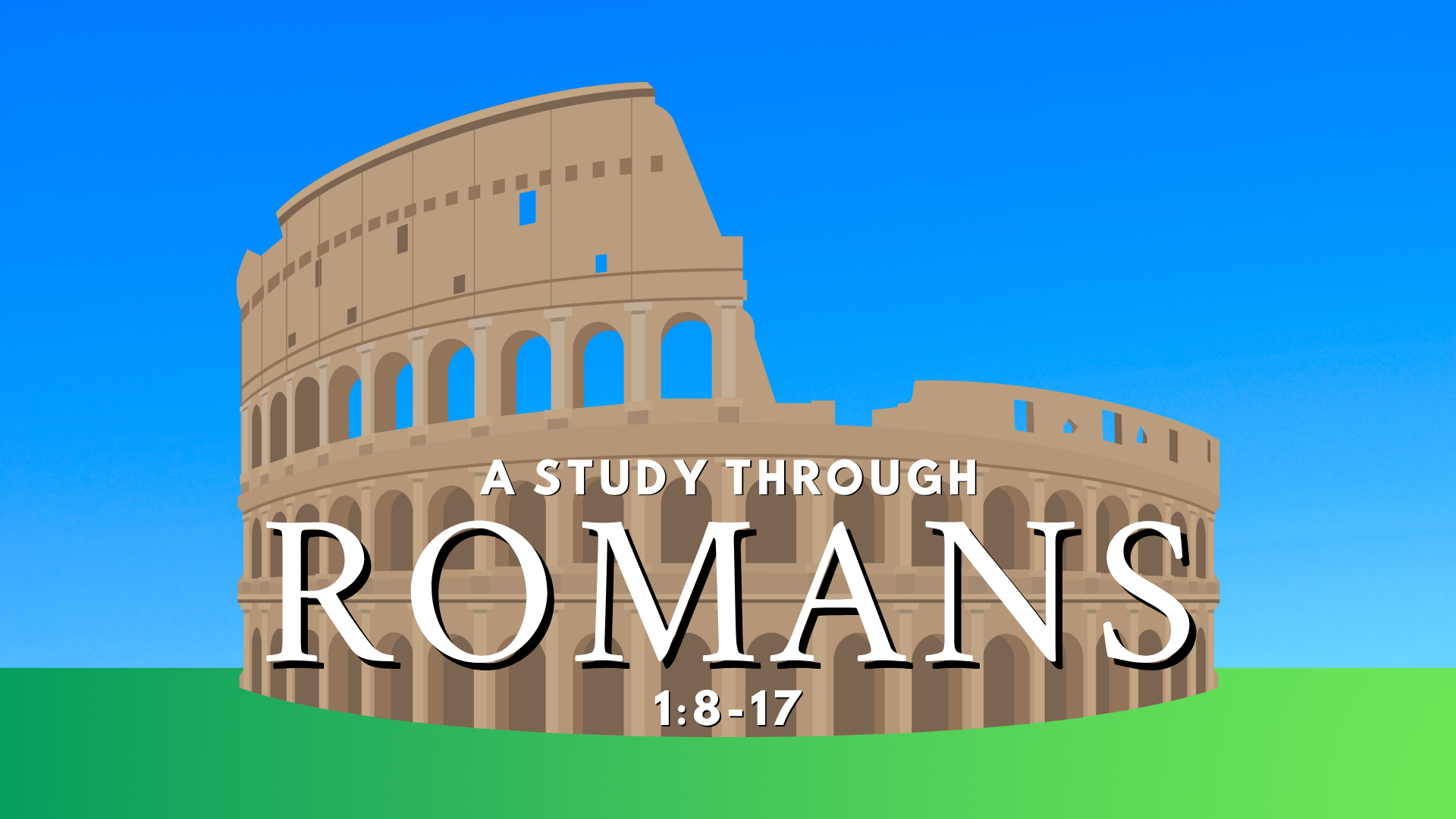Paul’s Passion to Preach (1:8-15)
Paul expresses his love to the Christians in Rome in four key ways in this passage with four statements. We will examine this text by looking at each one.
“I Thank God for You”
Paul tended to open with statements of thanks to God for the recipients of his letters. He does so here in v. 8:
“…I thank my God through Jesus Christ for you all, that your faith is spoken of throughout the whole world.”
Romans 1:8
Other passages in which Paul does this include, but are not limited to 1 Corinthians 1:4, Ephesians 1:16, Philippians 1:3, Colossians 1:3, 1 Thessalonians 1:2, 2 Thessalonians 1:3, 2 Timothy 1:3.
It is noteworthy that Paul states that he thanked “my God” in this verse. Paul certainly saw God as being very personal to him, andp[,
we should as well. God is certainly “our God,” as He has done everything in the world for “us” in a collective sense. He is, however, also a personal God, having died for my sins and yours and knowing the number of hairs on each one of our heads (Luke 12:7).
Paul is thankful to God for the faith of the Roman Christians, which had been “spoken of throughout the whole world” (v. 8). These people had certainly endured hardships and persecutions just for following Christ, and living in the “center of the world” at the time would allow word to spread quickly throughout the world. Paul had not brought the gospel to Rome, but he was certainly thankful that others had done so.
“I Pray to God for You”
“For God is my witness, whom I serve with my spirit in the gospel of His Son, that without ceasing I make mention of you always in my prayers, making request if, by some means, now at last I may find a way in the will of God to come to you.”
Romans 1:9-10
Paul called on God as his witness to the truthfulness of his statement that he is constantly praying for the Romans. This shows that he is doing what he asked of the Thessalonians when he said:
“…pray without ceasing”
1 Thessalonians 5:17
It is comforting and inspiring to know that Paul not only spent so much time travelling and preaching, but also clearly spent so much time in prayer.
He also prays a request that if it be God’s will that he could make his way to the Christians in Rome to see them and be with them, again, praying that that be the case “only in the will of God” (v. 10). We ought also to pray that our requests be granted so long as God wills, as James tells us:
“Come now, you who say, ‘Today or tomorrow we will go to such and such a city, spend a year there, buy and sell, and make a profit’; whereas you do not know what will happen tomorrow. For what is your life? It is even a vapor that appears for a little time and then vanishes away. Instead you ought to say, ‘If the Lord wills, we shall live and do this or that.'”
James 4:13-15
Prayer is our most powerful tool as Christians, and Paul did not cease to pray for the Christians in Rome.
“I Long to See You”
Paul greatly desired to meet the Christians in Rome. He had heard about them and about how word of their faith had spread through the world. He prayed for them constantly and admired their faith. He wanted to see them for a few reasons. Read on through verse 13:
“For I long to see you, that I may impart to you some spiritual gift, so that you may be established— that is, that I may be encouraged together with you by the mutual faith both of you and me. Now I do not want you to be unaware, brethren, that I often planned to come to you (but was hindered until now), that I might have some fruit among you also, just as among the other Gentiles.”
Romans 1:11-13
First, he wanted to “impart to [them] some spiritual gift” to help to establish them. This may have been through the laying on of hands to give some of them miraculous gifts, as was done by the apostles to help solidify and validate the early church. It also may have been spiritual blessing through teaching and edification to help strengthen them. Whether Paul intended to do either one of these things or a combination of both, he nevertheless sought to fortify the church in Rome to help them as they grow.
Secondly, Paul wanted to be strengthened and encouraged by the Roman Christians as well. He wanted them to encourage one another (v. 12).
Thirdly, he wanted to aid them in bringing even more people to Christ; he wanted to help them in evangelistic efforts. This is what he means when he writes, “that I might have some fruit among you also,” (v. 13).
“I Am Ready to Preach the Gospel of God to You”
Read the next two verses:
“I am a debtor both to Greeks and to barbarians, both to wise and to unwise. So, as much as is in me, I am ready to preach the gospel to you who are in Rome also.”
Romans 1:14-15
Paul viewed himself as being indebted to all mankind in respect to the preaching of the gospel. He indicates this with the phrase, “to Greeks and to barbarians,” which simply means “Greeks and non-Greeks,” thus, all people. These phrases just mean that the gospel is for all people, regardless of race, education, or any other delineation.
Because of all this, Paul was eager to preach to them (Christians and non-Christians alike) in Rome.
The takeaway from this portion of the text is that we should all have an eagerness to share the gospel. This should not come from obligation from God (although we are obligated to do so), but from a desire to share the gift that we have been given―salvation in Christ Jesus―with those who do not yet know Christ.
The Gospel’s Power (1:16-17)
It would be a disservice to Paul and to the Holy Spirit who authored this text through Paul not to lead this study directly into the next two verses, as the thoughts of the verses before flow so seamlessly into them. Anytime words like “for” are used in scripture, we must always look at what came before. “For” means that the coming statement is a result of the previous point. So continue on into verses 16 and 17:
“For I am not ashamed of the gospel of Christ, for it is the power of God to salvation for everyone who believes, for the Jew first and also for the Greek. For in it the righteousness of God is revealed from faith to faith; as it is written, ‘The just shall live by faith.'”
Romans 1:16-17
Paul is “ready to preach the gospel” (v. 15) FOR he is “not ashamed” of it.
The Gospel
“Gospel” is a term that literally means “good news.” The Greek root word appears over 150 times in the New Testament.
What power does the Gospel have? 1 Corinthians 15:1-5 can help us answer this:
“Moreover, brethren, I declare to you the gospel which I preached to you, which also you received and in which you stand, by which also you are saved, if you hold fast that word which I preached to you—unless you believed in vain. For I delivered to you first of all that which I also received: that Christ died for our sins according to the Scriptures, and that He was buried, and that He rose again the third day according to the Scriptures, and that He was seen by Cephas, then by the twelve.”
1 Corinthians 15:1-5
Those who receive the Gospel (accept it, embrace it, believe it) can then stand in it (live by it, practice it) and are therefore saved by it (vv.1-2).
What then is that “good news” that can give us salvation?
“that Christ died for our sins according to the Scriptures, and that He was buried, and that He rose again the third day according to the Scriptures”
1 Corinthians 15:3b-4
Our hope of salvation lies in these three truths presented above: Christ died for our sins, He was buried, and He rose again. This thought continues throughout chapter 15 of 1 Corinthians. If Christ hadn’t died, death would not have been defeated. He was buried so that we could be buried in baptism in His likeness. If He did not rise from the dead, then there is no resurrection from the dead, and we will not live again after death. Glory be to God that those three things are the truth!
The Gospel is powerful. Those three truths are the most important truths in the history of the world. They are our purpose for having been created. The apostles and so many others died defending these truths; they died preaching the Gospel. What will we do with it?
For All
The Gospel is for all. “[I]t is the power of God to salvation for everyone who believes, for the Jew first and also for the Greek” (v. 16). The Gospel is for all because everyone needs the Gospel. Paul will go on to say in chapter 3:
“[F]or all have sinned and fall short of the glory of God,”
Romans 3:23
Everyone sins and has need of the saving power of God. Without the saving grace of God, we would all be doomed to eternal death completely away from God’s presence. We should bow down in praise and thanks to God that He wants us to be with Him so much that He gave us this plan.
The Just Shall Live by Faith
This passage ends with a quotation of Habakkuk 2:4, which says:
“Behold the proud, His soul is not upright in him; But the just shall live by his faith.”
Habakkuk 2:4
God’s righteousness is revealed in the Gospel out of one’s initial believing faith to a continuing life of faith that leads to eternal life in God.
David Roper said it well in his study of Romans:
“Faith had endured physical life in Habakkuk’s day, and it would result in spiritual life in Paul’s day.”
Roper, 32
Conclusion
Paul clearly had a strong passion and eagerness to preach the “good news” of salvation in Christ not only to the Romans, but to all people. The Gospel is for everyone who ever lives, because everyone who ever lives is doomed without it. May we strive to have the same passion for spreading this good news that has blessed our lives to all those around us, for everyone around us needs to hear this awesome message. Ω
Sources
- Romans (New King James Version)
- Th 24th Annual West Virginia School of Preaching Victory Lectures | “The Depth and the Riches of God’s Saving Grace”
- “Paul’s Passion to Preach the Gospel” (Romans 1:8-15) by Charles C. Pugh III
- “The Power of the Gospel” (Romans 1:16-17) by Phil Sanders
- Truth for Today’s “A Study of the Book of Romans: Part I (1:8-8:13)” by David Roper

